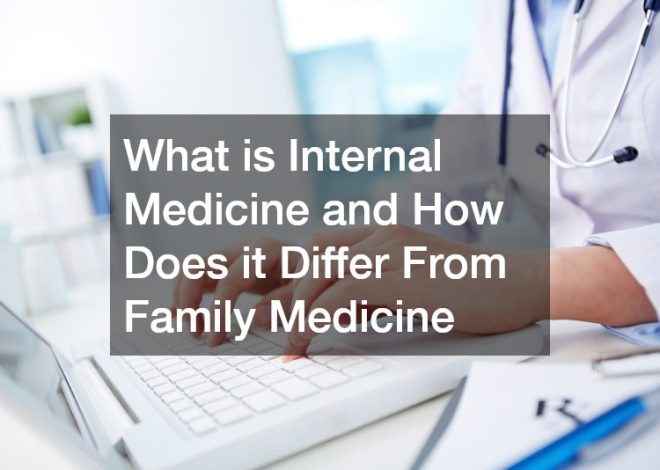
Special Medicine and Doctors for Your Health Issues

Healthcare is not one-size-fits-all. While general medicine addresses everyday illnesses and preventative care, there are many health issues that require specialized attention. This is where special medicine and highly trained doctors come into play. Special medicine refers to medical practices, treatments, and interventions that focus on very specific health needs—ranging from managing chronic pain and correcting dental issues to addressing vision problems, orthopedic concerns, and even addiction recovery.
The importance of special medicine has grown as modern science deepens our understanding of how unique each person’s health journey can be. A patient who suffers from persistent back pain will need different care than someone with vision loss, heart disease, or substance abuse concerns. Specialized doctors and targeted treatments make it possible to address these diverse challenges effectively, ensuring that patients receive care designed for their unique condition rather than relying on general solutions that may only partially help.
In this guide, we will explore the world of special medicine, highlight the roles of specialized doctors, and show how these professionals can make a significant difference in patients’ lives. From understanding when you need special medicine to learning about risks, benefits, and future trends, this article provides a comprehensive look at how specialized care can transform health outcomes and quality of life.
1. What is Special Medicine?

Special medicine refers to medical disciplines and treatments that go beyond the scope of general healthcare. Unlike routine checkups or standard prescriptions provided by family doctors, special medicine often involves advanced diagnostics, tailored treatment plans, and the involvement of professionals who are experts in a narrow field.
For example, a family doctor might identify that you are experiencing severe migraines but may refer you to a neurologist for specialized testing and long-term care. Similarly, someone with persistent hip pain may benefit from orthopedic specialists who can provide targeted therapies that general practitioners cannot.
Special medicine encompasses many areas: oncology for cancer, cardiology for heart disease, dentistry for oral health, and more. In essence, it represents the branch of healthcare that dives deeply into specific problems rather than addressing broad health maintenance.
2. How Do I Know if I Need Special Medicine?
Deciding whether you need special medicine can sometimes be confusing. Many people rely on their primary physician for routine care, but some health issues require advanced solutions that generalists may not be equipped to provide.
For example, individuals experiencing chronic or severe pain may benefit from visiting pain management centers. These centers employ physicians trained in treating ongoing pain caused by conditions like arthritis, nerve disorders, or post-surgical complications. Instead of prescribing temporary pain relief, they create long-term strategies that include medication management, physical therapies, injections, or even minimally invasive procedures.
Other signs you may need special medicine include:
- Repeated visits to your family doctor without significant improvement.
- Health issues that interfere with daily life, such as mobility limitations, constant fatigue, or recurring infections.
- Conditions requiring specialized equipment, advanced imaging, or lab tests.
In such cases, referrals to specialists can help you get targeted care designed to tackle the root cause of your problem.
3. Who are the Specialized Doctors?
Specialized doctors are healthcare providers who have pursued advanced training and certifications in specific medical areas. They differ from general practitioners by focusing exclusively on one field, allowing them to provide in-depth expertise.
For instance, local dentists play a vital role in special medicine by addressing oral health issues. Oral infections, tooth decay, and gum disease can have far-reaching effects on overall health, including links to heart conditions. Specialized dentists such as orthodontists, periodontists, or oral surgeons take dentistry even further by providing care that goes beyond basic cleanings or fillings.
Other examples of specialized doctors include:
- Cardiologists (heart health)
- Endocrinologists (hormone and metabolism disorders)
- Ophthalmologists (eye diseases)
- Orthopedic surgeons (bone and joint issues)
- Psychiatrists (mental health conditions)
Each of these professionals represents a branch of special medicine, focusing on delivering precise treatments that improve patient outcomes.
4. What Are the Benefits of Special Medicine?

The primary benefit of special medicine is precision. Patients receive care that directly targets their condition, often resulting in faster recovery times, reduced symptoms, and better long-term health outcomes.
Take the example of working with a physical therapist. General doctors may prescribe rest or basic medication for joint pain, but a physical therapist designs customized exercise programs that strengthen muscles, restore mobility, and prevent further injury. This specialized care not only addresses current pain but also helps avoid future problems.
Other benefits include:
- Access to cutting-edge treatments and technologies.
- Coordinated care plans tailored to individual needs.
- Improved quality of life through targeted interventions.
- Early detection of complex conditions before they worsen.
In short, special medicine gives patients a more focused approach, ensuring health challenges are addressed at their root rather than superficially.
5. Are There Any Risks Involved?
As with any medical care, there are risks associated with special medicine. Some treatments may cause side effects, require invasive procedures, or involve significant lifestyle adjustments.
For example, chiropractic services offer many patients relief from back and neck pain, but in rare cases, improper adjustments can lead to complications. Similarly, certain specialized medications may carry stronger side effects than general prescriptions.
Other risks include:
- Higher costs compared to general care.
- Potential dependence on specialized treatments.
- Misdiagnosis if a specialist does not fully consider a patient’s overall health.
That said, the risks of special medicine are usually outweighed by its benefits, especially when patients seek reputable providers and follow recommended guidelines.
6. How Do I Access Special Medicine Services?
Accessing special medicine services typically begins with a referral from your primary physician, who can evaluate your condition and recommend the appropriate specialist. However, depending on your healthcare system, insurance plan, or the nature of your health concern, you may have the option to self-refer to certain specialists. This flexibility can be particularly useful for conditions that require timely intervention.
For example, an individual managing obesity might directly approach a weight loss center. These centers provide a multifaceted approach, combining nutritional guidance, exercise plans, behavioral therapy, and, when necessary, medical interventions such as prescription medications or supervised programs. Similarly, someone struggling with addiction may contact an alcohol rehab center directly, where specialized medicines, therapy, and support groups are integrated to promote recovery.
Other methods to access special medicine include researching local specialists online, checking hospital or clinic specialty departments, or using your insurance provider’s directory to ensure coverage. Telemedicine has also become increasingly valuable, offering remote consultations with specialists who may not be locally available.
Ultimately, the goal is to identify a specialist whose expertise aligns with your condition. Confirming their credentials, years of experience, and reputation ensures you receive safe, effective, and tailored care. Establishing this connection early can streamline treatment and improve overall outcomes.
7. What Are Some Common Special Medicines Available?

Special medicines cover a wide spectrum, from pharmaceuticals to advanced therapies, and their scope is expanding rapidly as research uncovers new ways to address complex health issues. Unlike general medicines that aim to relieve broad symptoms, special medicines are often designed to intervene at the root of a condition, offering more precise and lasting results. They frequently represent the latest achievements in medical science, combining innovation with carefully regulated practices to ensure both safety and effectiveness.
For instance, patients struggling with substance use disorders often benefit from treatments at an alcohol rehab center, where special medicines are incorporated into detoxification and recovery plans. These medications can ease withdrawal symptoms, reduce cravings, and create a more stable foundation for long-term sobriety. In many cases, combining such medicines with counseling and behavioral therapy significantly improves recovery outcomes.
Beyond addiction care, special medicines are transforming treatment in diverse fields. Biologics target the immune system to control conditions like Crohn’s disease or rheumatoid arthritis. In pain care, specialized injections or nerve blocks provide focused relief for chronic conditions. Even something as routine as prescription eye drops represents special medicine when designed to slow glaucoma progression and preserve vision.
8. How is Special Medicine Developed and Tested?
The development of special medicine is a rigorous process that ensures safety, effectiveness, and compliance with regulatory standards. Each new treatment is the result of years—sometimes decades—of dedicated research and collaboration between scientists, doctors, and regulatory bodies. The goal is not only to create therapies that work but also to protect patients from harmful side effects or ineffective interventions.
For example, eye care services often depend on innovations such as medicated drops, corrective lenses, or advanced surgical options like laser procedures. These treatments originate in research labs, where scientists study how new compounds interact with human tissue. From there, the journey continues with extensive preclinical testing and carefully designed clinical trials. Before a treatment can be widely offered, it must show clear benefits for conditions such as glaucoma, cataracts, or macular degeneration while maintaining a strong safety profile.
The stages of development typically include:
- Laboratory research to identify promising compounds.
- Animal testing for early safety data.
- Clinical trials in several phases with human volunteers.
- Regulatory approval from agencies such as the FDA.
Even after approval, medicines are subject to post-marketing surveillance, ensuring ongoing safety and effectiveness as they are used in larger populations.
9. What are the Future Trends in Special Medicine?
Special medicine continues to evolve, driven by technological innovation and deeper scientific knowledge. The future promises exciting advancements that could revolutionize patient care and reshape how people access treatment. As research expands, treatments are becoming more precise, less invasive, and increasingly customized to the needs of individual patients.
One area of growth is neck pain treatment, a health issue affecting millions due to desk jobs, smartphone use, and sedentary habits. With modern lifestyles leading to increased posture-related issues, researchers are developing non-invasive therapies like advanced physical therapy protocols, laser-based pain relief, and ergonomic devices to correct alignment. Regenerative medicine techniques, such as platelet-rich plasma (PRP) injections or stem cell applications, are also gaining momentum. At the same time, improved chiropractic tools and wearable posture-correction technology are expected to provide sustainable, long-term relief for patients who struggle with chronic neck discomfort.
Other exciting trends include:
- Personalized medicine using genetic information to tailor treatments with higher success rates.
- Artificial intelligence delivering faster and more accurate diagnoses by analyzing imaging and patient data.
- Telemedicine platforms breaking down barriers, making specialist care accessible even in rural or underserved regions.
Taken together, these advancements suggest that special medicine will not only become more precise but also more widely available to patients in diverse communities. The future holds the promise of healthcare that is faster, more effective, and more patient-centered than ever before.
10. How Does Special Medicine Impact Patient Lifestyle?

The impact of special medicine on a patient’s lifestyle can be profound. While general medicine focuses on keeping patients healthy, special medicine often transforms daily living by alleviating symptoms, improving function, and restoring independence.
For example, patients struggling with hip pain may find daily activities like walking or climbing stairs nearly impossible. Specialized treatments—from physical therapy to surgical intervention—can dramatically improve mobility, reduce discomfort, and restore quality of life.
Similarly, individuals receiving specialized care for vision or dental health often experience greater confidence and social engagement. Special medicine is not just about treatment; it’s about helping patients live fuller, more comfortable lives.
Special medicine and specialized doctors are essential pillars of modern healthcare. They provide precise, targeted treatments for health issues that general medicine cannot adequately address. From family doctors making referrals to pain management centers, local dentists, physical therapists, and even services like weight loss centers or alcohol rehab programs, special medicine spans a wide array of disciplines designed to meet unique patient needs.
While there are risks, the benefits of specialized care far outweigh them, offering improved outcomes, better quality of life, and hope for individuals facing difficult conditions. Looking ahead, the future of special medicine holds even more promise with advancements in personalized care, technology, and innovative therapies.
For patients, understanding the importance of special medicine means gaining the confidence to seek the right help when needed. Whether it’s managing chronic pain, restoring mobility, or addressing mental health challenges, specialized doctors and treatments can transform lives. By embracing special medicine, you ensure not just treatment—but the opportunity to thrive.


